Reflecting on the 4th negotiations, brackets, and how we ‘Bridge to Busan’
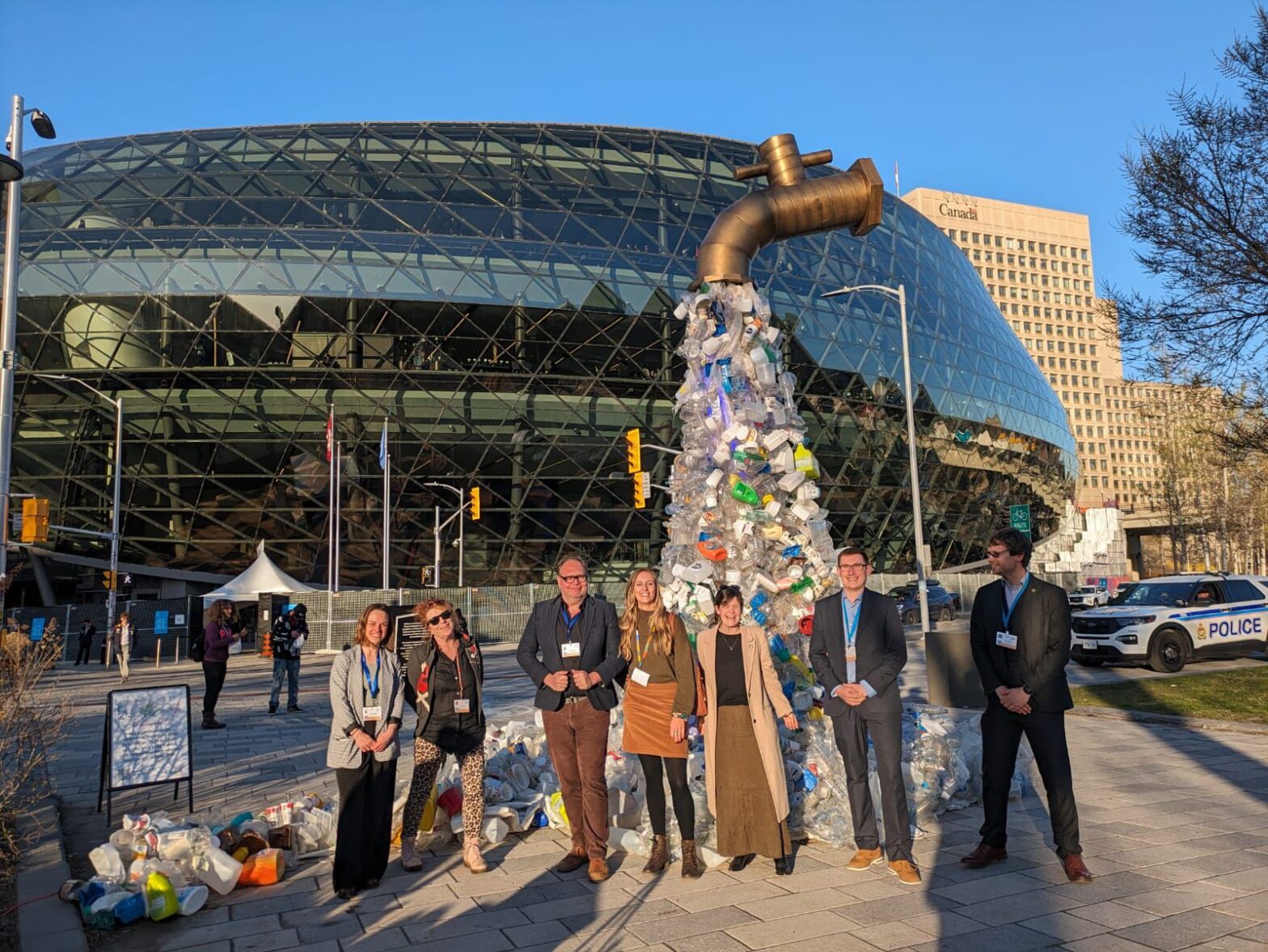
With only seven days of official negotiations remaining to develop a Global Plastics Treaty by the end of 2024, both member states and observer delegations are concerned about whether an ambitious Treaty is deliverable in that time.
The seven days of the fourth round of negotiations (INC-4) in Ottawa presented slow and steady progress. The committee has successfully completed two rounds of streamlining the Treaty draft text and many hours of hard work to bring the text closer to completion at INC-5 in November. However, there are not many negotiating days left, and with the vast majority of the text still up for debate there is uncertainty about how ambitious the Treaty will be.
Highlights of INC-4
- Delegates began line-by-line negotiations to streamline the Treaty’s 69-page Revised Draft Text to facilitate agreement at INC-5 in November. No interventions have been removed, meaning most perspectives remain on the table. The new streamlined text will be the basis for discussions in Busan.
- The Committee agreed on a mandate for intersessional work, which will inform discussions at INC5. Although more limited in scope than some countries and many scientists and other stakeholders wanted, the intersessional work will focus on Means of Implementation (particularly on a dedicated financial mechanism) and approaches to product design, focusing on chemicals of concern in plastic products and recyclability and reusability.
“Plastics last forever, but this INC should not“
Colombian Delegation
- Pacific Small Island Developing States (PSIDS) took the lead in championing the push for strong production measures in the Treaty given the contribution of plastic production to climate change and the generation of plastic waste. As a result, the Bridge to Busan Declaration was launched by PSIDS with the support of the Secretariat of the Pacific Regional Environment Programme (SPREP). The Declaration, which has to date been signed by 33 countries and 39 stakeholders (including the Global Plastics Policy Centre), urges that the Treaty must include measures to reduce the production of primary plastic polymers.
- Peru and Rwanda submitted a proposal to reduce global production of primary plastic polymers by 40% by 2040 compared to 2025 levels. The proposal marks a strong show of ambition in the negotiation process to address the full life cycle of plastics instead of a downstream focus. The reduction of primary plastic polymer production has also been called for by the research community in a recent paper by Baztan et al.
- An open-ended legal drafting group was agreed upon, with a mandate to commence their work at INC-5. The group will help clarify the text of the future agreement, which is much needed because there are now over 3500 brackets in the text, making it very challenging to read and understand. The group will comprise two Co-Chairs and others with legal expertise appointed by the INC and member states.
Challenges of INC-4
- Although streamlined, the revised provisions in the draft treaty remain ambiguous. The week in Ottawa consisted of two rounds of streamlining the text with subsequent line-by-line discussions for members to modify text. The streamlined draft is full of brackets, with many of these representing simply a divergence of views and others added by members aiming to complicate the process. Member states must still negotiate all bracketed content, meaning overall progress at INC-4 was limited.
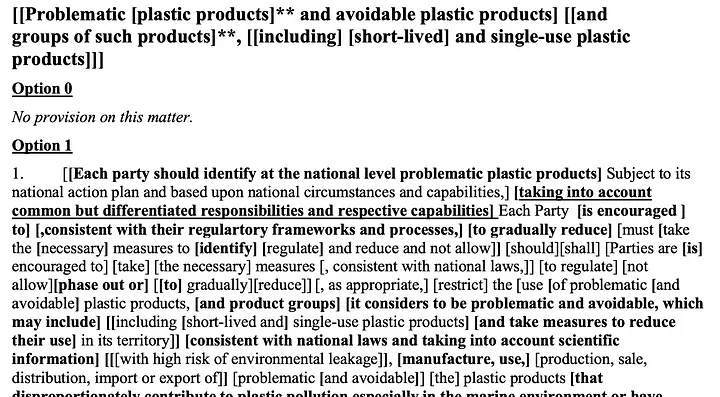
- A coalition of fossil fuel–aligned countries called the “Like-Minded Group of Countries” resisted proposals for upstream interventions. Even the use of the word ‘polymer’ was contested, with a focus on recycling and other downstream interventions their preferred approach.
- Tough negotiations on a mandate for intersessional work dominated the final plenary. The result was a limited mandate covering intersessional discussions on mid- to downstream interventions. The intersessional work does not provide space for additional formal negotiations, rather it consists of expert meetings for member states to gather more insights, evidence, and data to inform their positions when formal negotiations resume. Securing intersessional work required two concessions. Firstly, the US called for criteria-based approaches to be changed to include non-criteria based approaches, diluting the discussion time. Second, the Like-Minded Group of Countries forced discussions to focus on product design, recyclability and reusability of plastic products, shutting the door to wider discussions of upstream interventions during the intersessional period.
- Limited plenary time resulted in a limited number of statements from observers. While the Chair and Secretariat highlighted the importance of observer input many times, there remains no efficient mechanism to deliver observer inputs in the room at this point of the INC process.
Procedural and venue issues
- The first half of the week was hampered by technical and organisational issues. The first day of discussions in Contact Group 1 was significantly delayed by multiple room changes as the microphones were not working. The contact group rooms were criticised on multiple occasions for being unsuitable due to limited space being available for member delegations to sit together. Throughout the week the WiFi was almost unusable in the meeting rooms causing frustration for observers and preventing member delegates from being able to effectively communicate with their teams outside the room while the session was ongoing.
- There were frequent schedule changes with no live notifications to communicate this to delegates. On multiple occasions, delegates had gathered in a meeting room, only for the live timetable to update, changing the start time or location of the meeting after the previously scheduled start of the session.
- Catering in the venue was predominantly wrapped in single-use cardboard packaging with plastic coating, which was disappointing given previous INC meeting venues all had a no single-use plastic policy.
- Delegations spent a considerable amount of potential negotiation time on pleasantries, such as thanking the Chair and the Secretariat. For instance, during one plenary session, we estimated that approximately 40% of each statement was spent on pleasantries. While respect and gratitude are indeed valuable, collective thanking of organisers and coordinators would save a significant amount of time.
- There are continuing disparities with regard to participation in INCs. Travel costs and visa restrictions result in inequality of access for the Africa Group and other low income countries, whilst high income countries are able to send large delegations. As a result, many countries were unable to participate in all parallel sessions or have full representation throughout, which was demonstrated by a lack of interventions from the floor, and by the large number of country name cards left unused in some sessions.
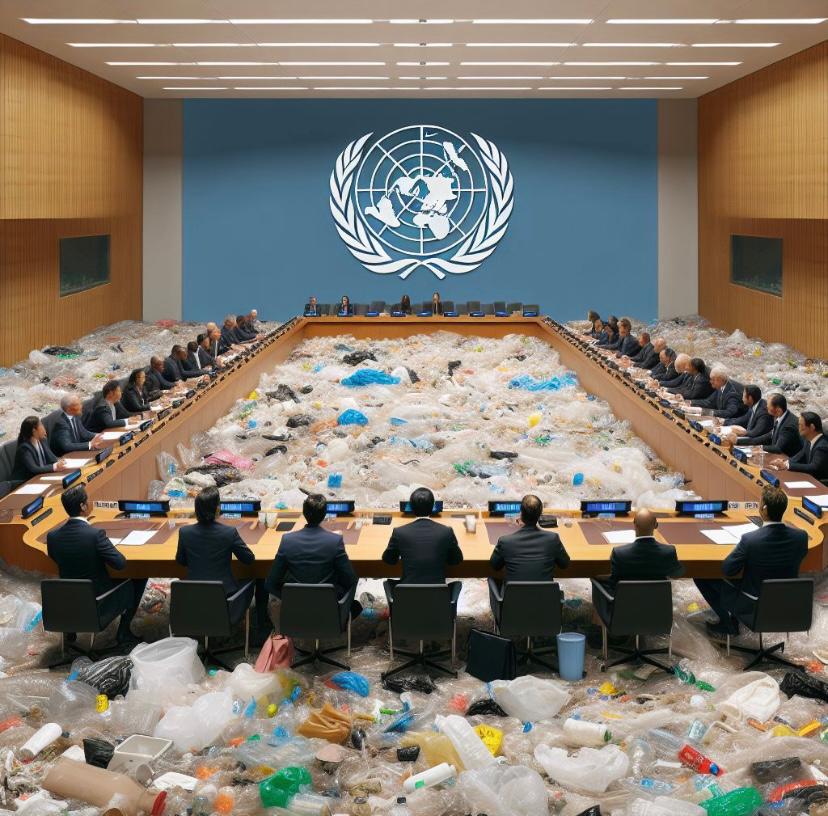
The Global Plastics Policy Centre Team in Ottawa
With the support of the UK Government and Chilean Government, the Revolution Plastics Institute and Ellen MacArthur Foundation hosted a game show-style event entitled ‘Demystifying Reuse’. Following a series of workshops, participants with expert knowledge from across the sector performed in the event as game show contestants. The game show posed questions to contestants and audience alike about the role of reuse systems in tackling plastic pollution. More than 250 people attended, including country delegates, NGOs, academics and industry representatives. The game show format presented a unique opportunity to survey opinion and collect data from those in the room, thus utilising arts-based research methods in a global space. A summary of the event and outcomes can be found here.
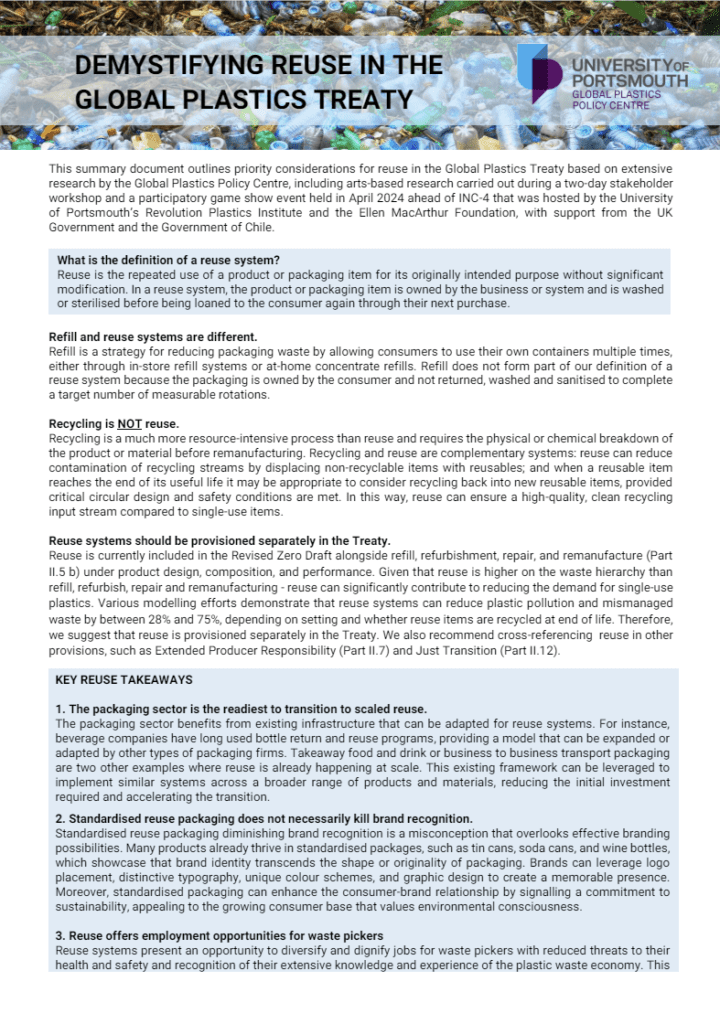
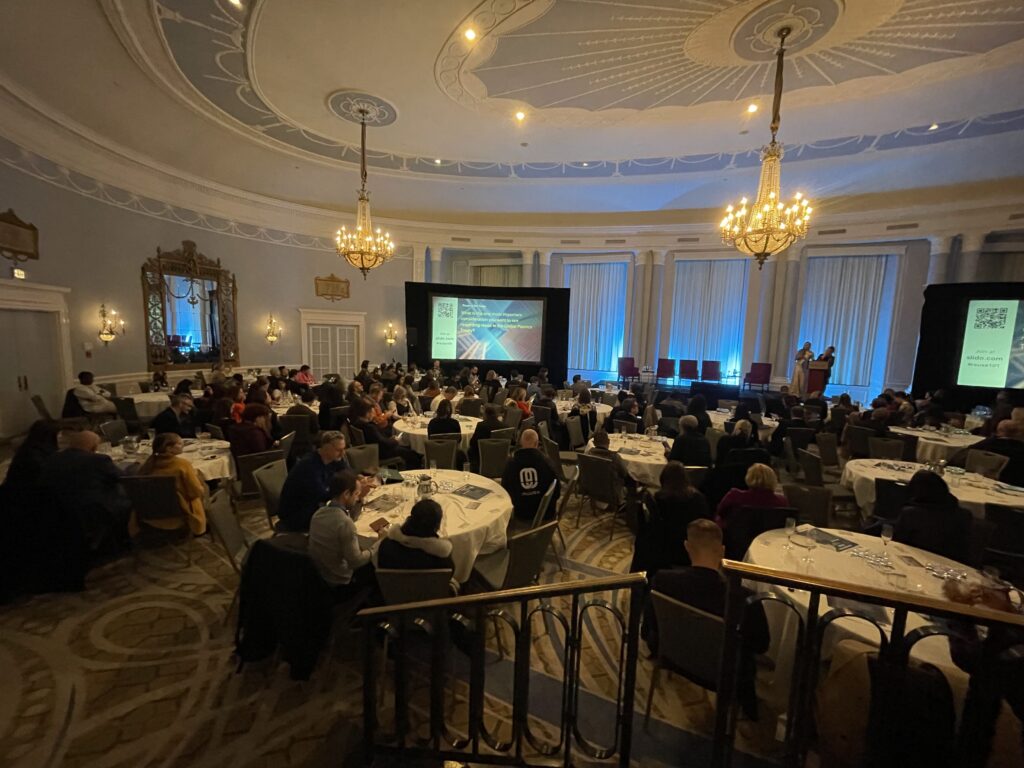
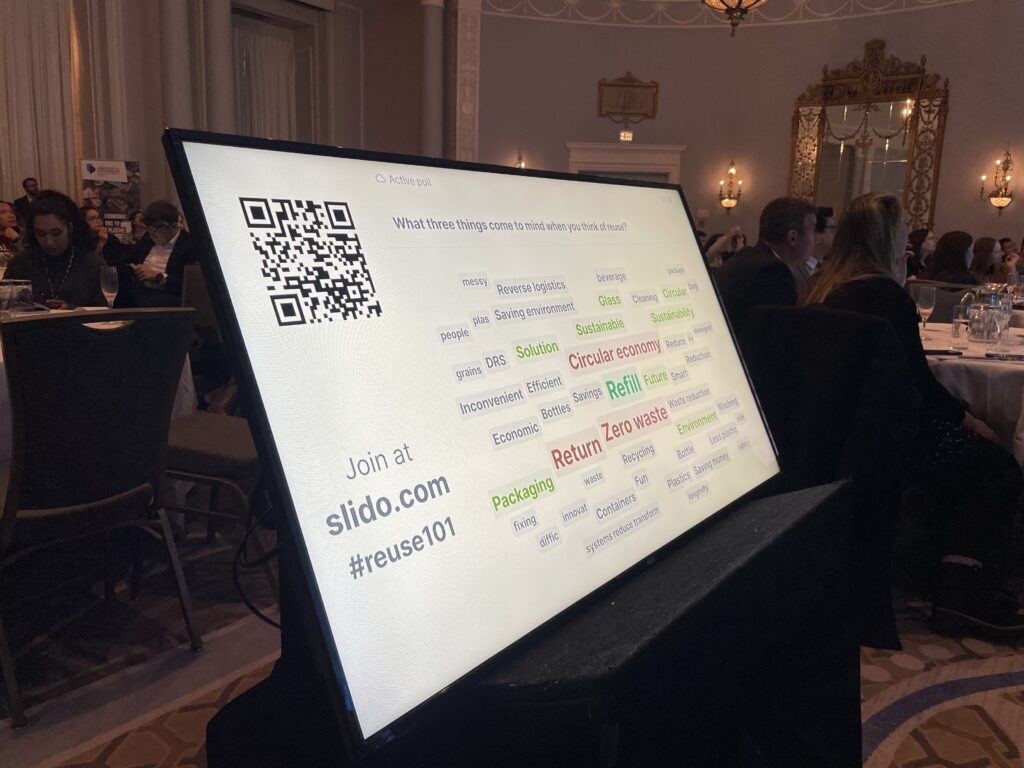
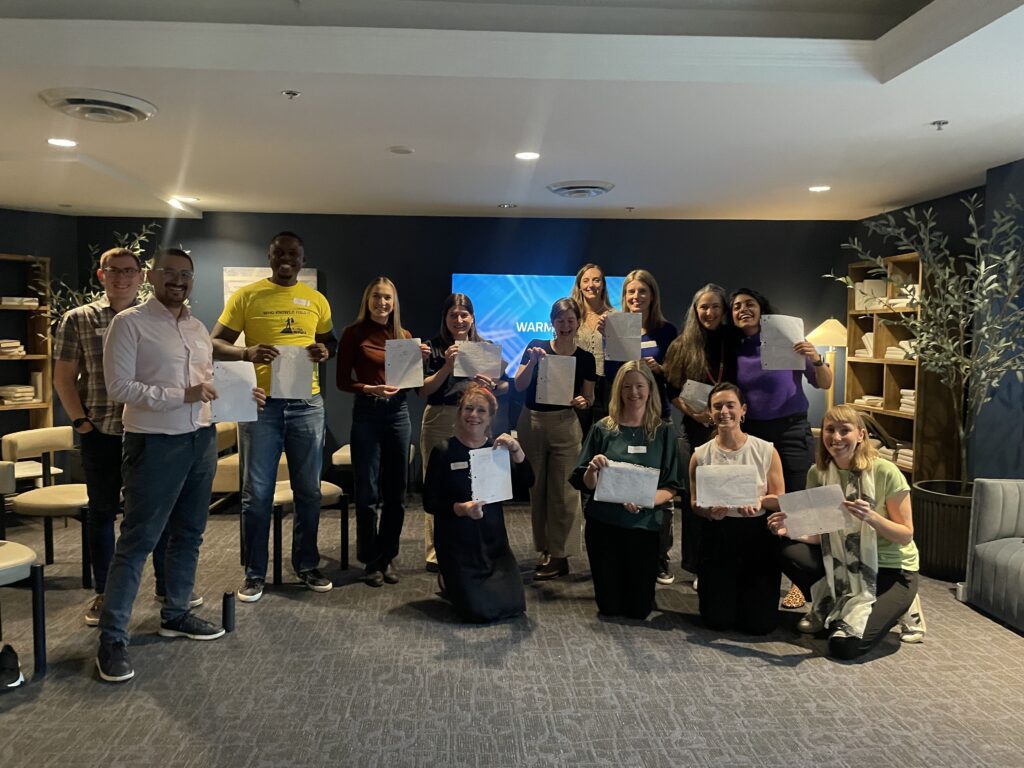
Our team was actively engaged in the INC process. We were approached by a number of delegations, both national and regional, to provide insights based on our policy research. We also provided suggested treaty text to some delegations including on reuse, national plans and just transition.
We had team members in nearly every plenary and contact group session to track the statements made and understand the direction of the negotiations. Based on this, our colleague Sam Winton, whose PhD is focused on the Treaty process, produced a daily blog. You can read all of these here: https://plasticspolicy.port.ac.uk/updates/
What is next and what is in store for INC-5 in November?
- Intersessional work should commence shortly on Means of Implementation (particularly on a financial mechanism) and approaches to address product design, focusing on recyclability and reusability. However, the exact modalities for the intersessional work are not fully clear. We await further information from the Secretariat.
- The Secretariat will shortly release a compilation of the streamlined text produced across negotiations at INC-4. Members have asked that the text be forwarded to INC-5 with no further changes from the Co-Facilitators.
- The Chair will present the proposed approach to INC-5 in a scenario note a few weeks before the meeting. The scenario note will be critical in setting the scene for the negotiations in the final session.
- The Rules of Procedure will need to be formally adopted, which have so far been delayed. The Rules of Procedure are a set of guidelines that govern how negotiations are conducted. They outline the processes for decision-making, voting, and the conduct of participants, ensuring that proceedings are orderly, transparent, and fair. If the ability to vote on contested matters (Rule 38.1) is pushed through, it will have major implications for how the week progresses.